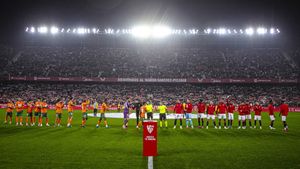Sergey Lavrov, Russia’s Foreign Minister, has made headlines with his recent assertion dismissing the value of negotiations with Ukraine. According to statements reported by Russian state media, Lavrov stated, "There is no point to continue negotiations with Ukraine." This bold claim encapsulates the growing divide between Russia and Ukraine as military tensions continue to escalate.
The backdrop of Lavrov’s comments is the persistent standstill of diplomatic efforts, which have faltered since the onset of Russia’s full-scale invasion of Ukraine three years ago. Lavrov’s emphasis on military objectives over diplomatic solutions has left many questioning the future of peace talks.
During his remarks, Lavrov expressed frustration, pointing out his belief, as expressed through various interviews, about Ukraine’s unwillingness to engage meaningfully. He indicated, with the increasing military focus adopted by Moscow, the likelihood of resuming fruitful negotiations is becoming ever slimmer. "We are prepared to continue our military efforts to achieve our objectives," he underscored, directing attention away from potential reconciliation.
The ramifications of Lavrov's stance could be far-reaching, potentially leading to prolonged conflict and continued suffering for civilians trapped within the war zone. The international community has been closely monitoring the situation, with many observers voicing concern about the dynamics of power and the impact on future negotiations.
The notion of stalled negotiations has been echoed by various analysts who note how Lavrov's position reflects deep-rooted tensions not just between the two nations, but also within the broader geopolitical climate. Many fear this could lead to exacerbation rather than resolution, particularly as winter sets upon the region.
Organizations and leaders around the globe continue to call for renewed discussions, emphasizing the humanitarian need for peace to alleviate the humanitarian crises spawned by the conflict. The pressing question remains: how to bridge the chasm intended by statements like those from Lavrov and turn back toward dialogue?
With Lavrov's declaration, the weathering diplomatic efforts face enormous challenges. Ukrainian officials have maintained their stance, emphasizing the importance of negotiations, yet each public statement appears to deepen the divide. Lavrov’s firm declaration has reinforced perceptions of militaristic determination within the Kremlin and illustrated how the war has shifted decisively toward absolute military engagements.
The results from this standoff could reverberate beyond the nations involved, potentially affecting global security dynamics, refugee movements, and international relations as nations pick sides increasingly aligned with one side or the other.
Citizens caught within the conflict may continue to feel the strain, caught between the agendas of conflicting powers as the door to negotiations tightens. Lavrov's remarks may signify another chapter of prolonged warfare, decidedly shifting the focus away from conversations toward confrontation.
To encapsulate the state of affairs, Lavrov's recent statements on negotiations shine light on the broader themes of discord and tension enveloping the Ukraine-Russia relationship. Many analysts will be watching closely as developments evolve around Lavrov’s stance and whether any room for negotiation can arise from what seems to be increasingly binary choices: war or peace, military engagement or civil resolve.



